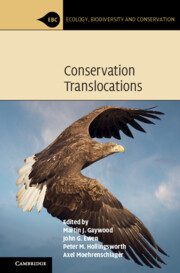Book contents
- Frontmatter
- Dedication
- Contents
- Contributors
- Foreword
- Preface
- Acknowledgements
- Part I Conservation Translocations: Getting Started
- Part II Conservation Translocations: The Key Issues
- 3 Conservation Translocations and the Law
- 4 Decision-Making in Animal Conservation Translocations: Biological Considerations and Beyond
- 5 Animal Disease and Conservation Translocations
- 6 Animal Welfare, Animal Rights, and Conservation Translocations: Moving Forward in the Face of Ethical Dilemmas
- 7 Conservation Translocations for Plants
- 8 Plant Health, Biosecurity, and Conservation Translocations
- 9 Genomics and Conservation Translocations
- 10 The Human Dimensions and the Public Engagement Spectrum of Conservation Translocation
- 11 Assisted Colonisation and Ecological Replacement
- 12 The Role of Conservation Translocations in Rewilding and De-extinction
- Part III Conservation Translocations: Looking to the Future
- Part IV Case Studies
- Index
- Plates
9 - Genomics and Conservation Translocations
from Part II - Conservation Translocations: The Key Issues
Published online by Cambridge University Press: 07 December 2022
- Frontmatter
- Dedication
- Contents
- Contributors
- Foreword
- Preface
- Acknowledgements
- Part I Conservation Translocations: Getting Started
- Part II Conservation Translocations: The Key Issues
- 3 Conservation Translocations and the Law
- 4 Decision-Making in Animal Conservation Translocations: Biological Considerations and Beyond
- 5 Animal Disease and Conservation Translocations
- 6 Animal Welfare, Animal Rights, and Conservation Translocations: Moving Forward in the Face of Ethical Dilemmas
- 7 Conservation Translocations for Plants
- 8 Plant Health, Biosecurity, and Conservation Translocations
- 9 Genomics and Conservation Translocations
- 10 The Human Dimensions and the Public Engagement Spectrum of Conservation Translocation
- 11 Assisted Colonisation and Ecological Replacement
- 12 The Role of Conservation Translocations in Rewilding and De-extinction
- Part III Conservation Translocations: Looking to the Future
- Part IV Case Studies
- Index
- Plates
Summary
Advances in genomic science are providing high-resolution insights into the diversity of species and populations, and increased understanding of how they function and interact. The application of genomic data to conservation translocations is now widespread, with many examples of genomic data being used to guide the implementation of translocations, ranging from selection of donor individuals/populations, understanding the dynamics of inter-specific interactions, and the design and monitoring of population reinforcements to achieve genetic and/or evolutionary rescue. The rapidly accelerating generation of genomic data from the world’s species will lead to further major advances in understanding biodiversity at the genomic level, with associated benefits for translocation management and monitoring. However, genomic data and genomic technologies are not a panacea, and despite the power of the approaches, uncertainties can remain in data interpretation and translation into practical management actions. As the science at the interface of genomics and conservation translocations continues to develop, there is a pressing need to focus continually on translating data to support practical decision-making and, at least in the short term, to develop further guidance and thinking that allows extrapolation from well-resourced studies with extensive genomic data to guide actions and decisions in translocations where generating genomic data is not yet feasible. As genetic/genomic technologies enable greater technological interventions for conservation translocations, the need to extend multi-stakeholder dialogue will continue and grow; this ranges from promoting informed dialogue between geneticists and conservationists to ensure effective deployment of approaches and resources, to wider societal engagement in setting the agenda for if, when, and how approaches involving genetic modification should be deployed.
Keywords
- Type
- Chapter
- Information
- Conservation Translocations , pp. 271 - 302Publisher: Cambridge University PressPrint publication year: 2022



